Blog updated 26.06.2024
Iceland is fascinating in so many ways. You know that this is a country that offers breath-taking landscapes, a lively culture, rich history, access to unique natural phenomena, vast open spaces, access to nature, and distinctive customs. Despite its small population, Iceland has made significant contributions to the world, both culturally and scientifically.

This article highlights some captivating and enjoyable facts about Iceland that make it a one-of-a-kind and captivating destination.
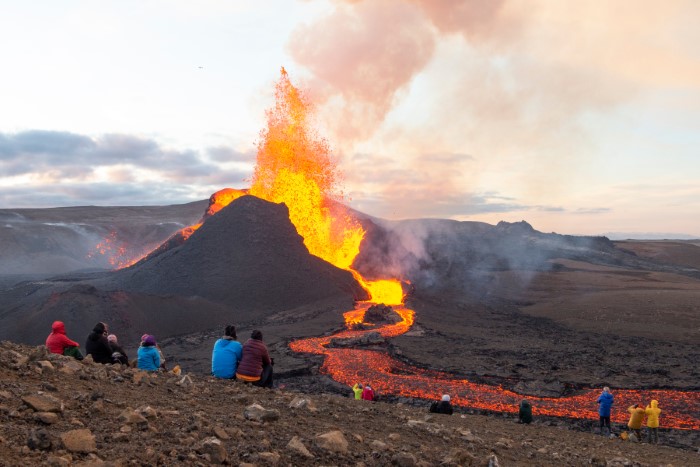
Icelanders having fun at the site of an active volcano.
Famous Icelanders
Iceland is the least populated country in Europe with just over 380,000 inhabitants but Icelanders have made an impressive mark globally, with a reputation for long lifespans averaging 83.1 years, among the highest worldwide.
Despite the small population, several Icelanders have gained worldwide fame and recognition for their contributions to arts, music, movies, sports, politics, pillaging, storytelling, banking, and more. Some of the most famous names are Björk, Hafþór Júlíus (The Mountain), Sigur Rós, Vigdís Finnbogadóttir, Baltasar Kormákur, and Arnaldur Indriðason.
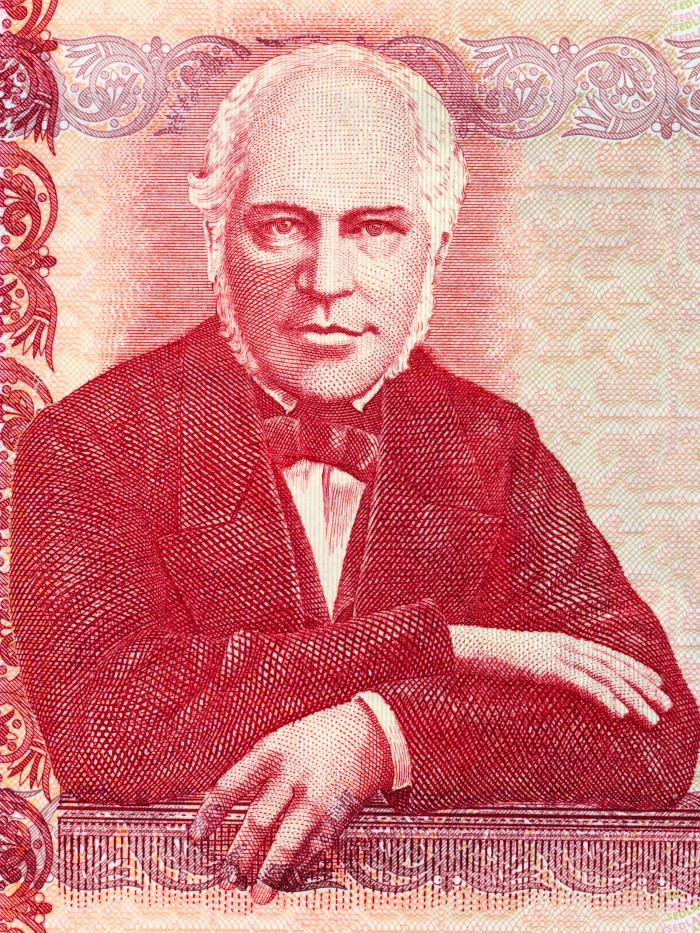
Jón Sigurðsson, Iceland's Independence movement hero.
A peaceful country
Iceland does not have a military or standing army and Icelanders have long been proud of their country’s pacifist tradition and Iceland ranks among the world's most peaceful countries, with its citizens enjoying a high standard of living.
Iceland’s defence forces consist of the Icelandic Coast Guard, which patrols Icelandic waters and monitors its airspave, and other services such as the National Commisstioner’s National Security and Special Forces Units.
Additionally, there is a Crisis Response Unit, operated by the Ministry of Foreign Affairs, which is a small peacekeeping force that has been deployed internationally since 2008.
A Viking language
The Icelandic language is another captivating aspect of the country, with its rich linguistic heritage that Icelanders take pride in. The language has remained relatively unchanged since the Viking Age and resembles Old Norse, considered one of the most challenging languages to learn. The country also boasts one of the highest literacy rates globally.
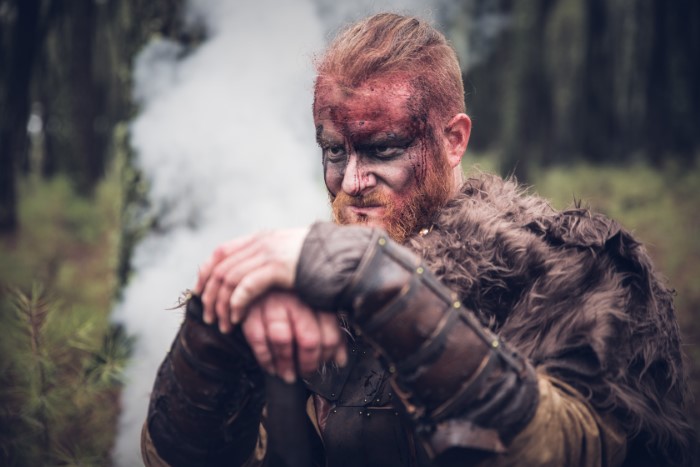
An Icelandic Viking.
Stories inspired by nature
Iceland's unique beauty is undeniable, with its geothermal hot springs, such as the renowned Blue Lagoon, and its position as the most massive geothermal energy producer globally. Icelandic folklore tells the stories of elves, trolls and other mystical creatures, and the country's distinctive terrain is the inspiration for many legends about magical beings.
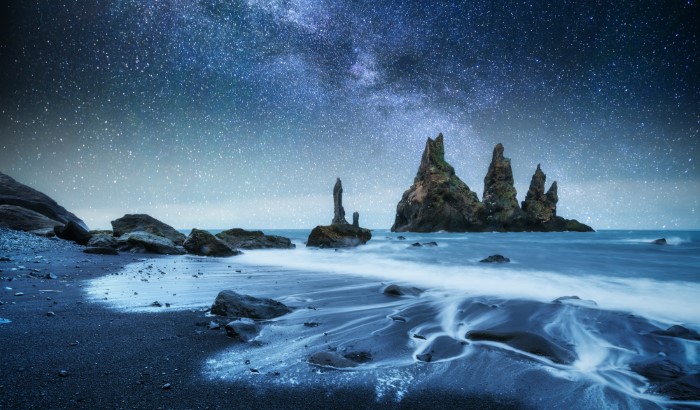
All sorts of rock formations, lava fields and rugged mountains inspired stories about trolls and hidden people.
A unique naming system
The naming system in Iceland is also fascinating, with last names derived from the father's first name, meaning surnames don't exist. Instead, Icelanders are the sons and daughters of (traditionally) their fathers. So Sigurður Guðmundsson is the son of Guðmundur and Halldóra Bjarnadóttir is the daughter of Bjarni.
Everyone is referred to by their first name, reflecting the country's tight-knit community and family connections.
Culinary traditions
Icelandic cuisine has a unique character shaped by the country's remote location and harsh climate. From fresh seafood to hearty meat dishes and unusual snacks, Icelandic cuisine is sure to offer visitors a taste of something different. A few must-try dishes while in Iceland are fresh fish, lamb soup, skyr, horse meat, hákarl, and harðfiskur.
Discover the flavors of Reykjavík on the Reykjavík Food Walk—an enticing guided tour where you’ll savor authentic Icelandic cuisine alongside a knowledgeable local guide.
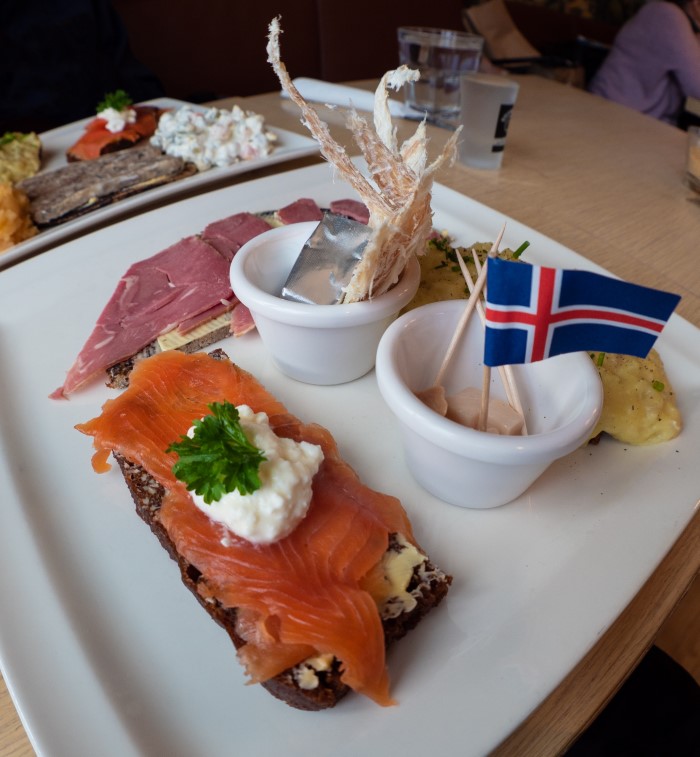
Delicious traditional Icelandic food.
Holidays
The country's cultural traditions are also notable, including the 13 trolls known as "Yule Lads" who bring gifts and play pranks on children during Christmas celebrations. Icelanders also have a tradition of exchanging books as gifts on Christmas Eve, indicating their fondness for literature and storytelling.
In conclusion, Iceland is a land of captivating contrasts, with stunning natural landscapes, unique customs, and a vibrant culture. Despite its small population, it has had an impact on the world, and its people have a robust sense of community and family ties. Iceland is a must-visit destination for those seeking an exceptional travel experience.
Experience Iceland’s festive traditions on a Reykjavík tour during the Holidays, followed by an afternoon exploring the scenic Golden Circle. The Golden Circle & Reykjavík Christmas Walk is the perfect combo to get into the pre-Christmas spirit both within and beyond the city’s landmarks!
If you're staying in Reykjavík, consider joining the Reykjavík Christmas Walk tour, or dive into the Funky Christmas Myths and Traditions.
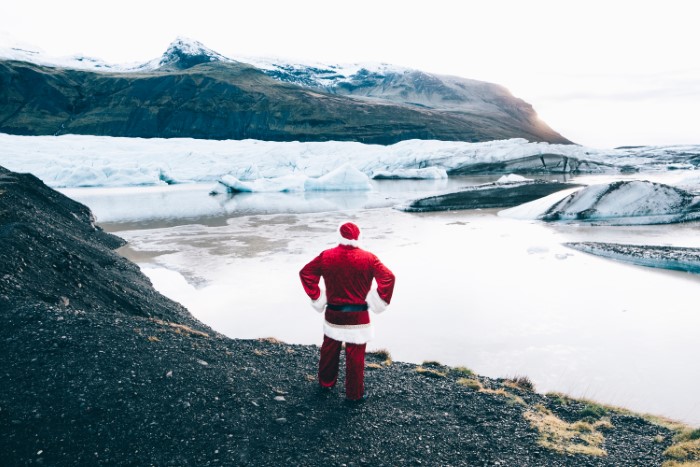
Icelandic Yule Lad in is natural element.
Here are 100 fun and interesting facts about Iceland, Icelanders and Icelandic culture:
- Iceland is known as the land of fire and ice because of its volcanic activity and glaciers.
- It is the least densely populated country in Europe with only 3 people per square kilometer.
- The Icelandic language is one of the oldest languages in the world and has changed very little since medieval times.
- Iceland has the highest literacy rate in the world at 99%.
- There are no mosquitoes in Iceland (but midges are recent settlers in the country).
- Icelandic people are among the happiest in the world according to the World Happiness Report.
- The Icelandic currency is the Icelandic Króna (ISK).
- Reykjavik, the capital of Iceland, is the northernmost capital city in the world.
- Iceland is home to the world's largest geothermal power plant.
- The Icelandic horse is a unique breed that has been isolated on the island for over 1,000 years.
- Iceland has the world's oldest parliament, the Althing, which was established in 930 AD.
- Iceland is one of the few places in the world where you can see the Northern Lights.
- The Icelandic flag has a red cross on a blue background with a white border.
- Icelanders have one of the longest life expectancies in the world, with an average life expectancy of 83.1 years.
- Icelanders use geothermal energy to heat most of their homes and buildings.
- Iceland has a unique Christmas tradition called Jólabókaflóð, which means "Christmas book flood."
- Icelanders have a tradition of eating fermented shark called hákarl.
- The Blue Lagoon is Iceland's most famous hot spring and is a popular tourist destination.
- Iceland is among only a few countries in the world that has no army.
- Iceland is located on the Mid-Atlantic Ridge, where the North American and Eurasian tectonic plates meet.
- Iceland has a total area of 103,000 square kilometers.
- The Icelandic national football team made it to the quarterfinals of the 2016 European Championship.
- Iceland has more than 130 volcanoes, 30 of which are currently active.
- The Icelandic fishing industry is one of the most important industries in the country.
- Icelanders have a unique way of naming their children, using the father's first name as a base for their last name.
- Iceland has more than 10,000 waterfalls.
- Iceland has a strong tradition of storytelling and folklore.
- Iceland has a high level of gender equality and was the first country in the world to have a democratically elected female president.
- Icelanders celebrate the summer solstice with a festival called Jónsmessa.
- The mid-winter feast in Iceland is called Þorrablót and is celebrated by eating old traditional foods, including fermented shark and smoked sheep's head.
- The Icelandic language has 32 letters, including the letters ð and þ, which are not found in the English alphabet.
- Iceland is the main nesting ground for puffins, which are a popular sightseeing attraction.
- The Icelandic national sport is glíma, an Icelandic folk wrestling.
- Iceland has a high standard of living and is considered one of the top countries in jobs and earnings.
- In 2010 the Eyjafjallajökull volcanic eruption disrupted air travel across Europe.
- The Icelandic word for "cheers" is skál.
- Iceland is home to Vatnajökull Glacier, which is the largest glacier in Europe.
- The majority of Icelanders does not believe in elves, but a large portion of the population is unwilling to deny their existence, and even more people respect the traditions, myths, and popular believes around them.
- Iceland is home to the world's first parliament, Alþingi, which was established in 930 AD.
- Iceland has a total of 11 glaciers, which cover over 11% of the country's land area.
- In Iceland, there is a naming committee that issues a list of approved baby names.
- The latest volcanic eruption in Iceland happened near Sýlingarfell, near the town of Grindavík, in 2024.
- Iceland is known for its dramatic landscapes, including black sand beaches, lava fields, ice caves, and geysers.
- Icelanders consume more Coca-Cola per capita than any other nation in the world.
- Iceland has a thriving music scene, with many internationally recognized artists hailing from the country, including Björk, Kaelo, Of Monsters And Men, and Sigur Rós.
- Iceland has a high level of renewable energy production, with over 80% of its energy coming from renewable sources.
- Iceland is one of the few countries in the world where you can swim outside in naturally heated pools, even in the winter.
- Iceland is home to one of the largest colonies of puffins in the world.
- The Icelandic word for "please" is "vinsamlegast"
- Iceland has a unique Christmas Eve tradition of exchanging books and spending the evening reading.
- Iceland is one of the best places in the world to see whales, including humpback whales and orcas.
- Icelanders have a tradition of giving gifts on the first day of summer.
- Iceland has a low crime rate and is considered one of the safest countries in the world.
- Iceland is home to many natural hot springs, including the Geysir, which is where the English word "geyser" comes from.
- Iceland has a strong literary tradition, with many famous Icelandic sagas dating back to Viking Age.
- Iceland has one of the highest levels of Internet usage in the world.
- Until 1986, Iceland only had one TV channel and until 1983 there was no TV on Thursdays nor in July.
- Icelanders claimed their independence from Denmark on June 17th 1944.
- Iceland has a high level of social welfare, with free healthcare and education for all citizens.
- Icelanders have a tradition of eating Skyr, a thick, creamy dairy product that is similar to yogurt.
- The longest word in the Icelandic language is Vaðlaheiðarvegavinnuverkamannaskúrsútidyralyklakippuhringur.
- Iceland has a unique tradition of making and eating a rye bread which can be baked underground using geothermal heat.
- Iceland has a thriving film industry, with many international productions filmed in the country, including Game of Thrones and Interstellar.
- Iceland has a high level of gender equality, with many women in positions of power in politics and business.
- Iceland is a popular destination for outdoor enthusiasts, with opportunities for hiking, skiing, and snowmobiling.
- Iceland is home to several national parks, including Þingvellir National Park, which is a UNESCO World Heritage Site.
- Iceland is one of the most sparsely populated countries in Europe, with a population of just over 370,000.
- Iceland is home to several species of unique wildlife, including the Arctic fox, the Icelandic horse, and the Icelandic sheepdog.
- Horses usually have three gaits, but the Icelandic horse has five.
- Icelanders generally enjoy the taste of black salty liquorice, especially if paired with chocolate.
- Icelanders are among the largest consumers of coffee per capita in the world.
- Icelanders are known for their love of books, with many households having their own mini-library.
- Icelanders have a tradition of eating fermented shark meat, which is considered a delicacy in the country.
- Icelanders have a strong work-life balance, with many companies offering flexible working hours and generous vacation time.
- Icelanders have a unique sense of humor, which often involves sarcasm and dry wit.
- Icelanders are very environmentally conscious and take pride in their country's clean air and water.
- Icelanders have a tradition of eating hot dogs, which are served with a variety of toppings including ketchup, mustard, remoulade, and fried onions.
- Icelanders have a strong sense of community and often participate in neighborhood events and festivals.
- Icelanders are known for their love of nature and spend a lot of time outdoors, even in the winter.
- Icelanders have a tradition of using wool for clothing and home goods, which is known for its warmth and durability.
- Icelanders have a tradition of celebrating the summer solstice with a festival called Jónsmessa, which involves bonfires and traditional foods.
- Icelanders are very health-conscious and enjoy outdoor activities like hiking, swimming, and biking.
- Icelanders customarily shake hands when greeting and taking leave of each other. Common greetings include góðan daginn (good day), gott kvöld (good evening), and bless (goodbye).
- Icelanders are known for their love of music, with many musicians and bands hailing from the country.
- It is considerd good manners to take off your shoes before entering a home in Iceland.
- Icelanders are very hospitable and often invite guests into their homes for meals and socializing.
- Icelanders have a unique accent, which is distinct from other Scandinavian languages.
- Icelanders are proud of their Viking heritage and Icelandic language and take great care to preserve their traditions.
- Icelanders are very well-educated, with a high percentage of the population having college degrees.
- Icelanders have a tradition of eating a variety of seafood, including salmon, cod, and haddock.
- Icelanders have a unique tradition of singing, with many choirs and vocal groups performing regularly.
- Icelanders have a strong tradition of baking, with many households making their own bread, cakes, and pastries.
- Icelanders have a tradition of drinking a type of liquor called Brennivín, which is made from potatoes and flavored with caraway seeds.
- Icelandic sheep run wild in summer, grazing on the mountains.
- Icelands first geothermal power plant started operations in 1969.
- Icelanders have a unique sense of fashion, which often includes warm layers and functional outdoor gear.
- Icelanders have a strong tradition of folk dancing, which is performed at festivals and events throughout the country.
- Icelanders have a strong sense of national identity, which is reflected in their language, culture, and traditions.
- Per capita, Iceland has the highest number of writers in the world. One in ten people in Iceland have published a book, and one in four people work in a creative field.
- Iceland does not have MacDonald’s or Burger King.